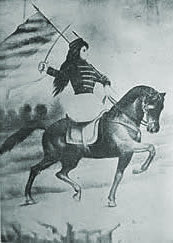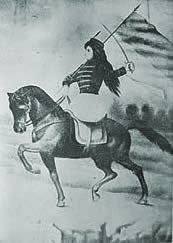
|
Women and Independence in Latin America An exploration of women's involvement in the Latin American Wars of Independence |

|

|
Women and Independence in Latin America An exploration of women's involvement in the Latin American Wars of Independence |

|
Gender:Male
Ethnic origen: White
Events:
| 1801 | - | Spain | - | Not applicable | - | He was born around 1801. |
| 1834 | - | Chile | - | Patriot | - | He accompanied Francisca Zubiaga into exile. |
| 1834 | - | Peru | - | Patriot | - | He was a colonel in Peru in 1834. |
Connections:
Flora Tristán, described byBiography:
Born around 1801, he was a colonel in the Peruvian army who accompanied Francisca Zubiaga y Bernales (“La Gamarra”) on an English boat as she fled from Peru on 18 May 1834. (Basadre, 85-91) Flora Tristán met him in April 1834: “Escudero is one of those adventurous Spaniards who left the beauties of their native Spain to seek their fortune in the New World; a man of great learning, he is, as occasion demands, soldier, writer, or trader. He has a lively mind, an inexhaustible imagination, a cheerful nature, and a persuasive eloquence. He writes with burning conviction, yet he is popular with all parties.
This extraordinary man was the devoted friend, trusted adviser and tireless secretary of Señora Gamarra; for three years he had fought under her command, accompanied her on all her campaigns and never recoiled from any of the audacious enterprises that this woman of truly Napoleonic ambition conceived. Colonel Escudero and I were friends from the start, for our natures were in harmony. He confided in me a great deal and kept me informed of all that passed in the Gamarra camp; from what he told me I understood that [General] San-Roman had committed just as many blunders as [General] Nieto.”
Tristán fantasised about making Escudero fall in love with her and then using him as a means of participating in the government of Peru. “He would have been between thirty and thirty-three, of medium height and very slim, with a dark skin, very black hair, sparkling yet soulful eyes and pearly teeth. His tender glance and melancholy smile lent his face a lofty and poetic air which quite carried me away. With such a man it seemed to me that nothing would have been impossible. I have the deep-seated conviction that had I become his wife I would have been very happy. In the midst of political turmoil he would have sung me ballads or played his guitar as unconcernedly as when he was a student in Salamanca.” (Tristán, 230-231.)
He accompanied La Gamarra into exile. Tristán quotes Escudero: “You behold me shackled here forever. Poor Señora Gamarra has been driven out everywhere, her cause is irretrievably lost. Her weak-minded cowardly husband has taken refuge in Santa-Cruz, and if any chances come his way he will be certain to bungle them. I cannot abandon this woman.” He went with her voluntarily into exile even though his presence was requested in Bolivia (La Gamarra was not welcome there). He maintained, “I shall stay with her to the end.” (Tristán, 292, 296)
References:
Basadre, Jorge (1981) Peruanos del siglo XIX
Tristán, Flora Jean Hawkes (editor). (1986) Peregrinations of a Pariah